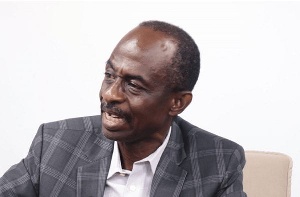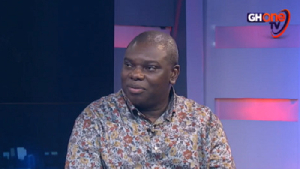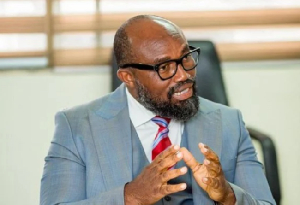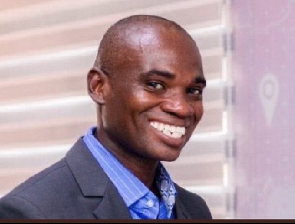By Kwame Okoampa-Ahoofe, Jr., Ph.D.
I was cursorily surfing the news pages of Ghanaweb.com when a quite sensational caption titled “Akufo-Addo Removed” (4/2/09) rudely and garishly flashed up my face. For split-second, I did not know what to make of such a caption; and the latter did not particularly bother me the least bit, knowing what those of us avid students of postcolonial Ghanaian journalism have come to expect, quality-wise, of what passes for journalism in our beloved motherland. And, of course, fatherland too!
Still, I momentarily attempted to surmise just what a caption titled “Akufo-Addo Removed” could possibly be about. I have known for quite sometime now that some stalwarts of the now-ruling National Democratic Congress (NDC) would, certainly as hell, deem it to be an epic windfall if the firebrand 2008 flagbearer of the opposition New Patriotic Party (NPP) were to be abruptly and permanently removed, by hook or crook, from the Ghanaian political landscape. Such feeling has become even more glaringly poignant as the Atta-Mills government exposes its underbelly of gross and abject administrative incompetence by the day, and the former attorney-general, foreign minister and Abuakwa-South Member of Parliament swells in popularity.
In all likelihood, should things continue to spiral downward under the Atta-Mills government as they presently appear, come 2012, the so-called National Democratic Congress would squarely blame its gubernatorial incompetence on the raging global economic crisis. The problem, though, is that this time around the P/NDC would not be so readily able to pass the buck. The party’s 20-year utter mismanagement of the Ghanaian economy is unlikely to be chalked among the fast-yellowing footnotes of postcolonial Ghanaian political history anytime soon.
Equally curious, however, is the decision of a pistol-whipped electorate to return unarguably the most corrupt and extortionate regime in contemporary Ghanaian history to the democratic reins of governance, fully certain, indeed, that the P/NDC is about everything but a democratic political culture.
Then again, isn’t the answer to the foregoing observation vividly contained in the same? After all, wouldn’t a pistol-whipped and thus irreparably traumatized citizenry almost invariably resort to the globally acknowledged and practically obvious, which is to masochistically continue to endure abuse, psychological and physical, in a paradoxical bid to prying the proverbial monkey off their backs?
At any rate, the sensational caption of “Akufo-Addo Removed” did not seem to make much sense, regardless of the multiplicity of angles from which the critical thinker and reader looked at it, short of an April Fool’s prank, of course, though since my maternal grandfather effectively banned both the anticipation and observation of April Fool’s Day, on grounds that it made a crude and sacrilegious mockery of the Passion of Christ, I have completely washed April 1 as a landmark memorial day out of my psyche and system at large.
Secondly, except in the jaundiced imagination of a John Kuma, one could not, for instance, remove the flagbearership or presidential candidacy of a man who had already lost an election and conceded as such. And so precisely what could this curious caption of “Akufo-Addo Removed” possibly be alluding to? It was, in fact, at this juncture that I decided to open the news file with the said caption, in order to familiarize myself with whatever swill, by way of contents, that its author had to offer a scandal- and gossip-wired misreading Ghanaian public.
The lead paragraph definitely gave me far more than I had expected. It tersely read: “The Edward Akufo-Addo Circle[,] named after the Second Republic[an] President, near the Togo[lese] Embassy at Cantoments[,] in Accra, no longer bears the name of the person it was [re-]named after.”
Okay, I chuckled contemptuously and snorted to myself, “And so what? This is hardly newsworthy. And Kufuor would be darn cognitively contused if he hadn’t anticipated such troglodytic mayhem in unwisely deciding to pass his crystal ball into the hands of the Ever-Bumbling Oguaa Kofi!” I uttered the foregoing almost nonchalantly, with a shoulder’s shrug.
In any case, I sneered for good measure: “What kind of ‘immortalizing’ monument takes the flimsy form of a wooden signboard except, of course, in Ghana where our greatest and most astute statesmen and women get honored with Lilliputian roundabouts – or rotaries – constructed out of chicken feed, even as their protégés and intellectual adjuncts are memorialized with lavish faux-pyramidal mausoleums?
“Good riddance,” I growled to myself and added, “Now Kofi Diawuo can have his rotten firewood back! And who cares what the Atwima town-council capo chooses to use these maggot-infested firewood to cook? His cockerel, maybe; or even, perhaps, his hotdog.”
On a more serious note, though, the first thought that seized my mind was to call for the immediate and summary razing of the Kwame Nkrumah Mausoleum as a retaliatory measure. Then I quickly retook possession of my mind, knowing, of course, that the whole world expected us Danquah-Busia scions to be ages ahead in civility over our ideological opponents and mortal enemies.
As usual, I decided to wait for several more days to elapse, in order to fully inform myself about the circumstances surrounding the apparent desecration of the hallowed memory of Justice Edward Akufo-Addo. And now, fortunately, it has just come to light that Ghana Telecom, sponsor of the reconstruction and renaming of the Akufo-Addo Circle, in a move aimed at face-lifting the latter, decided to remove and replace the legends, or signboards, re-identifying the former Cantoments Roundabout as the Akufo-Addo Circle.
The problem here is that the Ghana Telecom officials in charge of memorializing President Akufo-Addo ought to have given the public advance notice of their evidently noble intentions, thus healthily forestalling the possibility of public commotion. It is in the foregoing context that we solemnly call upon the management of Ghana Telecom to promptly render a public apology, if it has not already done that, and also to ensure that this potentially explosive faux-pas is not repeated in the offing. We also find it quite in order to provide our readers with a little background information on Justice Edward Akufo-Addo (1906-1979).
For some Ghanaians, notably those who are too young to have met or known the man, Justice Akufo-Addo may be just one of the six profiles crowding our new currency notes – the Cedi. In reality, in terms of personal laurels, or achievements, the ceremonial president of Ghana’s Second Republic stands head-and-shoulders above the man who, by dint of deft opportunism, led Ghana into the postcolonial era and who, erroneously, continues to be called the “Father” and “Founder” of Modern Ghana.
Unlike Mr. Kwame Nkrumah (1909?- 1972), also a member of the “Big Six,” or stalwarts of the United Gold Coast Convention (UGCC) arrested and detained in 1948, in the wake of what became widely known as the pro-independence riots, Mr. Akufo-Addo was a 1949-1950 member of the Gold Coast Legislative Council and, significantly, a bona fide member of the Coussey Constitutional Committee that drafted the legal instrument, or constitution, which prepared the erstwhile Gold Coast for sovereignty as Ghana (Nkrumah having been imprisoned for belated or second-day opportunistic rabble-rousing). Thus Akufo-Addo could aptly be called a Founding Father of Ghana in a way that Mr. Nkrumah, Ghana’s first prime minister and life-president, could not.
Secondly, while they both attended Achimota School, it was Mr. Akufo-Addo who earned a merit-based scholarship to Oxford University’s St. Peter’s College, where he obtained the Master of Arts degree in Mathematics, Politics and Philosophy. Nkrumah would, admirably, hustle his way into the predominantly African-American and racially segregated Lincoln University in Pennsylvania, USA. Akufo-Addo would also be called to the Middle Temple Bar in England, in 1940, while Nkrumah was still a student.
Personal achievements aside, as a Ghanaian Supreme Court Judge (together with Chief Justice Kobina Arku Korsah and Associate Justice Van Lare), Mr. Akufo-Addo would find Mr. Tawiah Adamafio, the man who knighted Mr. Nkrumah an “Osagyefo” through his trenchant newspaper editorials and articles, and Mr. Ebenezer Ako-Adjei, the man who introduced the future President Kwame Nkrumah into Dr. Danquah’s tutelage and confidence and, in effect, the mainstream of Ghanaian politics, not guilty of the alleged Kulungugu assassination attempt on the life of President Nkrumah. What is interesting and also significant here is that for daring to let justice run its certain, deliberate course, President Nkrumah, ruled largely by paranoia and vendetta, would unconstitutionally dismiss Justices Arku Korsah, Van Lare and Akufo-Addo from the Ghanaian Supreme Court. Messrs. Ako-Adjei, Adamafio and Kofi Crabbe would also be retried by a kangaroo court empanelled by President Nkrumah and sentenced to death.
It was, indeed, in corrective response to Nkrumah’s flagrant violation of the rule of law that prompted the Kotoka-led National Liberation Council (NLC) to name Mr. Akufo-Addo Chief Justice of the Ghana(ian) Supreme Court. The founder of the Ghanaian Statesman would also be named Chairman of the NLC’s Political Commission, in which capacity the venerable Oxbridge alumnus would selflessly and unreservedly offer his expert and constructive legal guidance to the transitional NLC government on the conduct of national affairs.
Thus it would simply be in character for those “Macho Men” who allegedly “uprooted” and squirreled away the Akufo-Addo Circle signboards to replace the latter with something far more durable and monumental, if Ghanaians are to be dully respected, globally, for learning to fittingly memorialize our patriarchs.
*Kwame Okoampa-Ahoofe, Jr., Ph.D., is Associate Professor of English, Journalism and Creative Writing at Nassau Community College of the State University of New York, Garden City. He is the author of 20 books, including “Dr. J. B. Danquah: Architect of Modern Ghana” (iUniverse.com, 2005). E-mail: okoampaahoofe@aol.com. ###
Opinions of Saturday, 11 April 2009
Columnist: Okoampa-Ahoofe, Kwame














